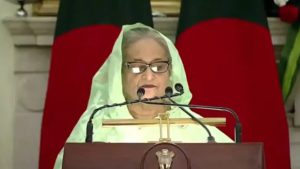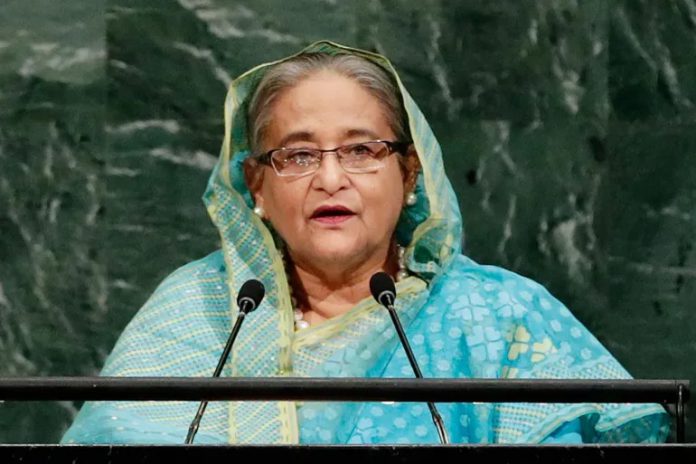A historic and controversial verdict in Bangladesh: special tribunal sentences ex-PM Sheikh Hasina to death for “crimes against humanity,” sparking nationwide unrest. Full report by Qalam Times.
Qalam Times News Network
Kolkata, 17.11.2025
Special Tribunal Sentences Hasina to Death as Nation Braces for Unrest
Verdict—that single word has thrown Bangladesh into a storm. A special tribunal in Dhaka has handed former Prime Minister Sheikh Hasina the death penalty, declaring her guilty of crimes against humanity linked to last year’s deadly protest crackdown. Hasina, currently in exile in India, was tried in absentia.

The verdict landed at a time when the country is already reeling from rising political violence. Schools in Dhaka and other major cities moved online, transport collapsed, and crude bomb blasts shook the capital as tensions flared ahead of the judgment.
Violence Intensifies as Court Announces Its Decision

The verdict followed days of escalating unrest. Authorities logged 32 crude bomb explosions on Wednesday alone, while dozens of buses were torched across multiple districts. Two more crude devices went off near Dhaka airport late Thursday, though no casualties were reported.
Bangladesh’s interim government, led by Nobel laureate Muhammad Yunus, has deployed 400 Border Guard soldiers across the capital. Checkpoints have been reinforced, and public gatherings sharply restricted. An office in Gopalganj—Hasina’s ancestral home—was targeted with a firebomb, while a Grameen Bank office in eastern Bangladesh was set ablaze.
Police have arrested several Awami League supporters over alleged involvement in sabotage and blasts.
Hasina Slams the Verdict, Calls It Politically Driven
Minutes after the tribunal’s decision, Hasina issued a sharply worded statement from exile, calling the ruling biased, engineered, and driven by “extremist forces” embedded in the unelected interim administration.
She called the trial a “sham, run by a pre-determined tribunal,” and insisted the judgment exposes “the naked intent of extremist actors” who wish to eliminate the Awami League from Bangladesh’s political future.
Hasina rejected all charges, arguing that neither she nor her party received a fair chance to defend themselves. She accused tribunal judges and lawyers of openly siding with the interim government.
Accusations Against the Interim Government
Hasina went further, arguing that the interim setup under Yunus has allowed public services to collapse and empowered criminal networks. She alleged that attacks on minorities—especially Hindus—have surged, while women’s rights face new pressures.
She also claimed extremist groups such as Hizb-ut-Tahrir have infiltrated the administration, threatening the country’s long-standing secular foundations.
Democracy Under Threat, Says Hasina
According to Hasina, the tribunal’s actions reflect a broader attempt to destroy democratic space and legitimize politically motivated violence. She urged the international community to examine what she called a “coordinated assault on Bangladesh’s constitutional order.”
The turmoil began after Hasina fled to India in August 2024 during widespread student-led demonstrations against a government job-quota system. Since then, Yunus’s interim leadership has been accused by the Awami League of targeting its supporters through arrests and intimidation.
Meanwhile, the government maintains that it is committed to holding free and credible elections—an assurance Hasina dismissed as “devoid of sincerity.”
Awami League spokespersons confirmed that the party will challenge the tribunal’s ruling on international platforms. Security in Dhaka has been tightened as fears of clashes rise.







